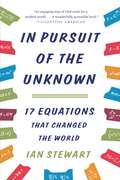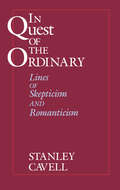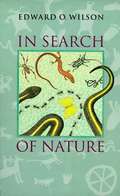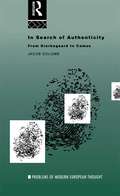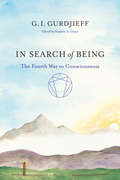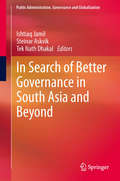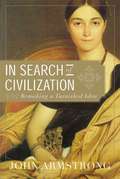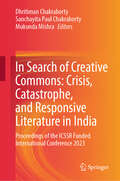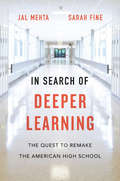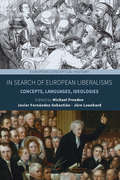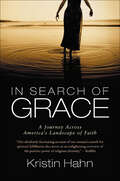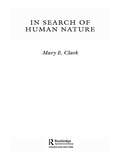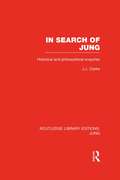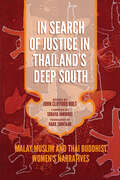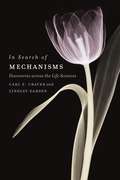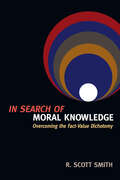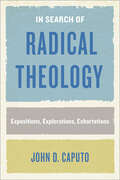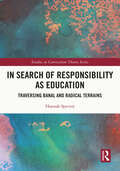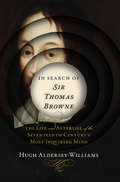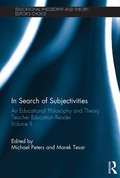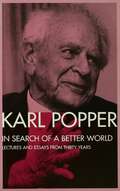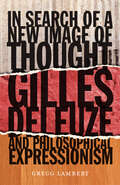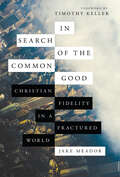- Table View
- List View
In Pursuit of the Unknown: 17 Equations That Changed the World
by Ian StewartFor general readers of science and technology titles, this engaging work on the meaning and impact of mathematical equations examines seventeen of the most important equations in history and explores not only the science behind the specific formulas, but also the wide influence of these germinal ideas on modern technologies and scientific study. Covering popular equations such as the Pythagorean theorem and Relativity, as well as more obscure and advanced topics, the work provides an entertaining journey through the development of theoretical mathematics, as well as an informative look at applied science. Numerous tables, graphs, and illustrations are provided throughout. Stewart is professor emeritus of mathematics at Warwick University. Annotation ©2012 Book News, Inc. , Portland, OR (booknews. com)
In Quest of the Ordinary: Lines of Skepticism and Romanticism
by Stanley CavellThese lectures by one of the most influential and original philosophers of the twentieth century constitute a sustained argument for the philosophical basis of romanticism, particularly in its American rendering. Through his examination of such authors as Emerson, Thoreau, Poe, Wordsworth, and Coleridge, Stanley Cavell shows that romanticism and American transcendentalism represent a serious philosophical response to the challenge of skepticism that underlies the writings of Wittgenstein and Austin on ordinary language.
In Quest of the Ordinary: Lines of Skepticism and Romanticism
by Stanley CavellThese lectures by one of the most influential and original philosophers of the twentieth century constitute a sustained argument for the philosophical basis of romanticism, particularly in its American rendering. Through his examination of such authors as Emerson, Thoreau, Poe, Wordsworth, and Coleridge, Stanley Cavell shows that romanticism and American transcendentalism represent a serious philosophical response to the challenge of skepticism that underlies the writings of Wittgenstein and Austin on ordinary language.
In Search Of Nature
by Edward O. WilsonDefinitely philisophical in nature. A scientist/philosophers view of life, nature etc. Not casual reading.
In Search of Authenticity: Existentialism from Kierkegaard to Camus (Problems of Modern European Thought)
by Jacob GolombGreat philosophers such as Kierkegaard, Nietzsche and Sartre have clearly been preoccupied by the possibility of authenticity. In this study, Jacob Golomb looks closely at the literature and writings of these philosophers in his analysis of their ethics. Golomb's writings shows his passionate commitment to the quest for the authenticity - particularly in our climate of post-modern scepticism. He argues that existentialism is all the more pertinent and relevant today when set against the general disillusionment which characterises the late twentieth century. This book is invaluable reading for those who have been fascinated by figures like Camus's Meursault, Sartre's Matthieu and Nietzsche's Zarathustra.
In Search of Being
by G. I. GurdjieffAre we able to say that life is governed by a group of conscious people? Where are they? Who are they? We see exactly the opposite: that life is governed by those who are the least conscious, by those who are most asleep. Provocative ideas such as these have attracted generations of thoughtful people to the methods of self-study and inner work devised by Gurdjieff, one of the most radical spiritual teachers of modern times. According to Gurdjieff, the wars raging at this very moment are nothing more than millions of sleeping people trying to annihilate millions of other sleeping people. Contrary to popular belief, there is no such as thing as progress and evolution as long as humanity remains asleep. Two hundred conscious people could change the whole of life on the earth, Gurdjieff says. If we want to become those conscious people, we must learn how to change ourselves. With the help of self-knowledge and an understanding of our relation to the universe, we can awaken to a higher level of being--if we wish to change ourselves. All of Gurdjieff's fundamental principles and methods of transforming the intellect, emotions, and body, in the system known as the Fourth Way, are presented in this book in his own clear, precise words preserved by his closest pupils. Arranged in an orderly sequence of passages drawn from two primary source books--P. D. Ouspensky's In Search of the Miraculous, and Views from the Real World, edited by Mme. Jeanne de Salzmann--this material is an indispensable introduction for those determined to undertake the efforts and practices necessary for awakening consciousness. All the basic concepts and methods are covered, including: * man is "asleep" * we have no unified "I" * the need for self-knowledge * functions of the human "machine" * states of consciousness * levels of being * three centers: moving, emotional, and thinking * personality and essence * the possibility of self-development * self-observation * remembering oneself * conscious evolution * the law of three forces * the ray of creation * the law of octaves * the Enneagram, a universal symbol * the variety of spiritual ways * esoteric Christianity * working in groups * the necessity of schools
In Search of Being: The Fourth Way to Consciousness
by G. I. GurdjieffOver one hundred years ago in Russia, G. I. Gurdjieff introduced a spiritual teaching of conscious evolution—a way of gnosis or &“knowledge of being&” passed on from remote antiquity. Gurdjieff&’s early talks in Europe were published in the form of chronological fragments preserved by his close followers P. D. Ouspensky and Jeanne de Salzmann. Now these teachings are presented as a comprehensive whole, covering a variety of subjects including states of consciousness, methods of self-study, spiritual work in groups, laws of the cosmos, and the universal symbol known as the Enneagram. Gurdjieff respected traditional religious practices, which he regarded as falling into three general categories or &“ways&”: the Way of the Fakir, related to mastery of the physical body; the Way of the Monk, based on faith and feeling; and the Way of the Yogi, which focuses on development of the mind. He presented his teaching as a &“Fourth Way&” that integrates these three aspects into a single path of self-knowledge. The principles are laid out as a way of knowing and experiencing an awakened level of being that must be verified for oneself.
In Search of Better Governance in South Asia and Beyond
by Ishtiaq Jamil Tek Nath Dhakal Steinar AskvikThe pursuit for better governance has assumed center stage in developmental discourse as well as reform initiatives of all organizations working for the public welfare, and includes such issues as service delivery and responding to citizens' needs and demands. In the era of globalization, multilevel and new modes of governance are changing the traditional governance models of nation states, accelerated by technological innovation, rising citizen expectation, policy intervention from international and multilateral donor communities, and the hegemony of western ideology imposed on many developing nations. However, a universally accepted and agreed upon definition of 'governance' still remains elusive. There is no consensus or agreement as to what would be the nature and form of governance and public administration. The question that is raised: Is there a universal governance mechanism that fits in all contexts or governance mechanisms should be based on home grown ideas?One can see various programs and policies of reforms and reorganizations in public administration in the developing countries, but these efforts have not been effective to address the challenging issues of economic development, employment generation, poverty reduction, ensuring equality of access to public services, maintaining fairness and equity, security and safety of citizens, social cohesion, democratic institution building, ensuring broader participation in the decision making process, and improving the quality of life. Therefore, there is a widespread concern for better governance or sound governance to bridge the gap between theory and practice, making this book of interest to academics as well as policy-makers in global public administration.
In Search of Civilization: Remaking a Tarnished Idea
by John Armstrong"A self-effacing, humane and unparanoid call to change our wealthy yet often barbaric world for the better." * In this provocative cri de coeur, the philosopher John Armstrong rescues the idea of civilization from irrelevance and connects it to our search for individual happiness. "Civilization" once referred to a society's technological prowess, its political development, or its cultural achievement. In the modern era, however, the word became burdened by the legacy of colonialism and connotations of elitism. For it to have value once again, according to Armstrong, we must understand that a society balances material prosperity with spiritual prosperity if it is to merit the term "civilized"—and currently we are impoverished. In Search of Civilization is his corrective. As he roams from anecdote to aesthetic appreciation—from the banality of an early job at an insurance company to the redemptive wonders of a seventeenth-century church spire visible out an office window, from Adam Smith's philosophy to the Japanese tea ceremony—Armstrong reminds us that culture lies within us and that its nourishment is essential to a flourishing society.
In Search of Creative Commons: Proceedings of the ICSSR Funded International Conference 2023
by Mukunda Mishra Dhritiman Chakraborty Sanchayita Paul ChakrabortyThis book contains selected papers presented at the international conference titled 'In Search of Creative Commons: Crisis, Catastrophe, and Responsive Literature in India', held at the Abid Ali Khan Centre for Digital Archive and Translation of Cultures, Gour Mahavidyalaya (College) from 31 August to 2 September, 2023 in collaboration with the Department of English, Dr. Meghnad Saha College. The conference was funded by the Indian Council of Social Science Research (ICSSR). In this book, three basic questions are considered. First, as humans try to live in-and-through catastrophes and exceptional situations in the contemporary world, what new perspective can literature as a creative form offer for healing and restorative purposes? Second, what new idioms and narrative styles, massive crises such as famine, partition, migration, the decimation of forests, rivers, and the disappearance of villages held up in creative articulations in colonial and postcolonial times in India? Can these representations be called “responsive literature”? Further, and this is the third major contention of this book, how can responsive literature be thought of as a conceptual category? What new transdisciplinary optic should be adopted to go beyond the limits of the “literary” and eventually include the “non-literary”? The objective of these discussions was to contribute to the larger discursive literature on disaster studies, which we believe has been excessively hegemonized by concepts from the West. By bringing in indigenous ideas from Bhasa Sahitya (language and literature), the images of samaj (society), samata (equity), and ahimsa (non-violence), the existing literature on catastrophe and crisis studies can finally be decolonized.
In Search of Deeper Learning: The Quest to Remake the American High School
by Jal MehtaAn award-winning professor and an accomplished educator, Jal Mehta and Sarah Fine take us beyond the hype of reform and inside some of America’s most innovative classrooms to show what is working—and what isn’t. In a world where test scores have been king, this boldly humanistic book offers a rich account of what education can be at its best.
In Search of European Liberalisms: Concepts, Languages, Ideologies (European Conceptual History #6)
by Michael Freeden Javier Fernández-Sebastián Jörn LeonhardSince the Enlightenment, liberalism as a concept has been foundational for European identity and politics, even as it has been increasingly interrogated and contested. This comprehensive study takes a fresh look at the diverse understandings and interpretations of the idea of liberalism in Europe, encompassing not just the familiar movements, doctrines, and political parties that fall under the heading of “liberal” but also the intertwined historical currents of thought behind them. Here we find not an abstract, universalized liberalism, but a complex and overlapping configuration of liberalisms tied to diverse linguistic, temporal, and political contexts.
In Search of Grace: A Journey Across America's Landscape of Faith
by Kristin HahnAfter years as a Hollywood writer and filmmaker, Kristin Hahn felt a crisis of faith: she had no spiritual group she could call her own. Setting out on a three-year journey, she began an investigation of America's religious traditions, practices, and beliefs.Crisscrossing the nation, Hahn spent a week cloistered in prayer with convent nuns and a month of Ramadan fasting with Muslims. She went door-to-door with young Mormon missionaries and head-to-head with turbaned Sikh yogis. She sat through marathon meditations with Buddhist masters and spent days in conversation and ceremony with an 0jibwe medicine man. Her explorations exposed her to the rich, ancient culture of the Jews and brought her into the enclaves of Christian Scientists and Amish farmers, as well as the less traditional realms of Scientology, neopagan witchcraft, and the congregations of new-age gurus.And this was only the beginning.Openhearted, humorous, and always thoughtful, In Search of Grace offers nourishment for our spiritual hunger -- and a myriad of ways to find a religious home.
In Search of Human Nature
by Mary E. ClarkHuman Nature offers a wide-ranging and holistic view of human nature from all perspectives: scientific, historical, and sociological. Mary Clark takes the most recent data from a dozen or more fields, and works it together with clarifying anecdotes and thought-provoking images to challenge conventional Western beliefs with hopeful new insights. Balancing the theories of cutting-edge neuroscience with the insights of primitive mythologies, Mary Clark provides down-to-earth suggestions for peacefully resolving global problems. Human Nature builds up a coherent, and above all positive, picture of who we really are.
In Search of Jung: Historical and Philosophical Enquiries (Routledge Library Editions: Jung)
by J. J. ClarkeIs Jung one of the most exciting and important thinkers of our age? Or is he just a dabbler in the occult and oriental mysticism? Although Jung has enjoyed wide popularity over time, he is still not accorded an appropriately honoured place in the history of modern thought. His interest in Oriental thought, alchemy and astrology has alienated many and he is often marginalized by scholars and academics. Originally published in 1992, this book aimed to rectify this state of affairs by showing that Jung was an important thinker in his own right and that his ideas play an important role at the heart of the intellectual debates of our age. The book explores Jung’s relationship with some of the great philosophical thinkers and movements such as Hegel, Nietzsche and existentialism, examines his links with the revolutionary ideas of modern physics and argues that his conception of the human psyche represents an important contribution to perennial questions about mind, human nature and human destiny.
In Search of Justice in Thailand’s Deep South: Malay Muslim and Thai Buddhist Women’s Narratives (Studies in Religion and Culture)
by Soraya JamjureeSince 2004, the violent conflict between Thai Buddhists and Malay Muslims has caused more than 7,500 deaths and 13,000 injuries in the southern border provinces of Thailand. This will be the first collection published in English to give voice to those who have rebounded from these profound personal tragedies to demand justice and peace.The ethnic and religious separatist insurgency in the southern provinces of Thailand is complex. Ninety to ninety-five percent of Thai citizens are Buddhists. In the southernmost provinces, however, Muslims are in the majority—yet they are governed by the Buddhist Thai capital in the north. In 2006 and 2014, the Thai government went through separate coups, resulting in differing policies to address this problem in the south, including a National Culture Act to promote "Thai-ness" throughout the country. In the south, this has resulted in a repressive and corrupt police force and military raids on Muslim villages, provoking the burning of schools and other symbols of Thai government, bombings, and even the killing of teachers and monks.The narratives collected here, primarily from women, testify that although the violence has been generated from both sides of the Buddhist/Muslim divide, the actions undertaken by armed forces of the Thai Buddhist state—including repressive violence and torture—have served as a catalyst for increased Muslim insurgency. These contributions reveal the fundamental problem of how a minority people can fully belong within a state that has insisted on religious, cultural, and linguistic homogenization.
In Search of Mechanisms: Discoveries across the Life Sciences
by Carl F. Craver Lindley DardenNeuroscientists investigate the mechanisms of spatial memory. Molecular biologists study the mechanisms of protein synthesis and the myriad mechanisms of gene regulation. Ecologists study nutrient cycling mechanisms and their devastating imbalances in estuaries such as the Chesapeake Bay. In fact, much of biology and its history involves biologists constructing, evaluating, and revising their understanding of mechanisms. With In Search of Mechanisms, Carl F. Craver and Lindley Darden offer both a descriptive and an instructional account of how biologists discover mechanisms. Drawing on examples from across the life sciences and through the centuries, Craver and Darden compile an impressive toolbox of strategies that biologists have used and will use again to reveal the mechanisms that produce, underlie, or maintain the phenomena characteristic of living things. They discuss the questions that figure in the search for mechanisms, characterizing the experimental, observational, and conceptual considerations used to answer them, all the while providing examples from the history of biology to highlight the kinds of evidence and reasoning strategies employed to assess mechanisms. At a deeper level, Craver and Darden pose a systematic view of what biology is, of how biology makes progress, of how biological discoveries are and might be made, and of why knowledge of biological mechanisms is important for the future of the human species.
In Search of Moral Knowledge: Overcoming the Fact-Value Dichotomy
by R. Scott SmithFor most of the church's history, people have seen Christian ethics as normative and universally applicable. Recently, however, this view has been lost, thanks to naturalism and relativism. R. Scott Smith argues that Christians need to overcome Kant's fact-value dichotomy and recover the possibility of genuine moral and theological knowledge.
In Search of Radical Theology: Expositions, Explorations, Exhortations (Perspectives In Continental Philosophy Ser.)
by John D. CaputoThese sparkling essays from a seasoned scholar are &“a great breath of fresh air in our claustrophobic and catastrophic time&” (Cornel West). Capturing a career&’s worth of thought and erudition, this rich volume treats readers to creative thought, careful argumentation, and sophisticated analysis transmitted through the lucid, accessible prose that has earned the author a wide readership of academics and non-academics alike. In tackling &“radical theology,&” John D. Caputo has in mind the deeper stream that courses its way through various historical and confessional theologies, upon which these theologies draw even while it disturbs them from within. They are well served by this disturbance because it keeps them on their toes. When we read about professional theologians&’ losing their jobs in confessional institutions, the chances are that, by earnestly digging into what is going on in their tradition, they have hit upon radical theological rock. Unlike modernist dismissals of religion, radical theology does not debunk but re-invents the theological tradition. Radical theology, Caputo says, is a double deconstruction—of supernatural theology on the one hand and of transcendental reason on the other, and therefore of the settled distinctions between the religious and the secular. Caputo also addresses the challenge for radical theology to earn a spot in the curriculum, given that the &“radical&” makes it suspect among the confessional seminaries while the &“theology&” renders it suspect among university seminars. Journeying from the academy to contemporary American culture, In Search of Radical Theology includes a captivating presentation of radical political theology for the time of Trump. This utterly unique volume not only brings readers on an enlightening tour of Caputo&’s thought but also invites us to accompany the author as he travels into intriguing new territories.
In Search of Responsibility as Education: Traversing Banal and Radical Terrains (Studies in Curriculum Theory Series)
by Hannah SpectorNot to be conflated with systems of accountability, this book examines responsibility as a subject of educational inquiry. The author argues that responsibility in its most radical sense is not connected to a higher authority. Rather, responsibility summons the actor to do the right thing when no one else is there to announce what is right; it involves speaking the truth in a world that is increasingly characterized by organized lying and organized irresponsibility. The search for responsibility as education is explored through a wide range of issues including: studying the ways in which the bureaucratization of the world undermine ethical consciousness; cultivating the ethical imagination in education which is not only vital to sustaining democracy, but to counteracting indifference to crimes against humanity and crimes against the planet; critiquing the imperial nationalism of a wave of education legislation requiring American schools to provide instruction on genocides and other mass atrocities that take place by ‘others’ and ‘abroad’ but not at ‘home’ or by ‘us’; centralizing a curriculum of common sense in an era marked by a breakdown of common sense and disinformation narratives; and facing a reality that can never be experienced: the end of the world. Reimagining education as an avenue for cultivating personal responsibility and global justice, this text will be of interest to students, scholars, and researchers working in curriculum studies, philosophy of education, educational policy, and teacher education.
In Search of Sir Thomas Browne: The Life and Afterlife of the Seventeenth Century's Most Inquiring Mind
by Hugh Aldersey-WilliamsThe extraordinary life and ideas of one of the greatest--and most neglected--minds in history. Sir Thomas Browne (1605-1682) was an English writer, physician, and philosopher whose work has inspired everyone from Ralph Waldo Emerson to Jorge Luis Borges, Virginia Woolf to Stephen Jay Gould. In an intellectual adventure like Sarah Bakewell's book about Montaigne, How to Live, Hugh Aldersey-Williams sets off not just to tell the story of Browne's life but to champion his skeptical nature and inquiring mind. Mixing botany, etymology, medicine, and literary history, Aldersey-Williams journeys in his hero's footsteps to introduce us to witches, zealots, natural wonders, and fabulous creatures of Browne's time and ours. We meet Browne the master prose stylist, responsible for introducing hundreds of words into English, including electricity, hallucination, and suicide. Aldersey-Williams reveals how Browne's preoccupations--how to disabuse the credulous of their foolish beliefs, what to make of order in nature, how to unite science and religion--are relevant today. In Search of Sir Thomas Browne is more than just a biography--it is a cabinet of wonders and an argument that Browne, standing at the very gates of modern science, remains an inquiring mind for our own time. As Stephen Greenblatt has written, Browne is "unnervingly one of our most adventurous contemporaries."
In Search of Subjectivities: An Educational Philosophy and Theory Teacher Education Reader, Volume II (Educational Philosophy and Theory: Editor’s Choice)
by Michael A Peters Marek TesarWhile traditionally identified as a practice-based endeavour, the many dimensions of teacher education raise important philosophical issues that emphasise the centrality of ethics to questions of relationality and professional practice. This second volume of the Educational Philosophy and Theory reader series demonstrates the continuing relevance of philosophical approaches to the field of teacher education. The collection of texts focuses on a wide range of topics, including teacher education in a cross-cultural context, the notion of unsuccessful teaching, democratic teacher education, the reflective teacher, the ethics and politics of teacher identity, and subjectivity and performance in teaching. Chapters also explore teacher education based on experiential learning as 'experience', demonstrating the continuing relevance of philosophical approaches to the field. In Search of Subjectivities will interest academics, researchers and postgraduate students in the fields of philosophy of education, philosophy, education, educational theory, teacher education, experiential philosophy, ethics, policy and politics of education, and professional practice.
In Search of a Better World: Lectures and Essays from Thirty Years
by Karl Popper'I want to begin by declaring that I regard scientific knowledge as the most important kind of knowledge we have', writes Sir Karl Popper in the opening essay of this book, which collects his meditations on the real improvements science has wrought in society, in politics and in the arts in the course of the twentieth century. His subjects range from the beginnings of scientific speculation in classical Greece to the destructive effects of twentieth century totalitarianism, from major figures of the Enlightenment such as Kant and Voltaire to the role of science and self-criticism in the arts. The essays offer striking new insights into the mind of one of the greatest twentieth century philosophers.
In Search of a New Image of Thought: Gilles Deleuze and Philosophical Expressionism
by Gregg LambertGregg Lambert demonstrates that since the publication of Proust and Signs in 1964 Gilles Deleuze&’s search for a new means of philosophical expression became a central theme of all of his oeuvre, including those written with psychoanalyst Félix Guattari. Lambert, like Deleuze, calls this &“the image of thought.&”Lambert&’s exploration begins with Deleuze&’s earliest exposition of the Proustian image of thought and then follows the &“tangled history&” of the image that runs through subsequent works, such as Kafka: Toward a Minor Literature, The Rhizome (which serves as an introduction to Deleuze&’s A Thousand Plateaus), and several later writings from the 1980s collected in Essays Critical and Clinical. Lambert shows how this topic underlies Deleuze&’s studies of modern cinema, where the image of thought is predominant in the analysis of the cinematic image—particularly in The Time-Image. Lambert finds it to be the fundamental concern of the brain proposed by Deleuze in the conclusion of What Is Philosophy?By connecting the various appearances of the image of thought that permeate Deleuze&’s entire corpus, Lambert reveals how thinking first assumes an image, how the images of thought become identified with the problem of expression early in the works, and how this issue turns into a primary motive for the more experimental works of philosophy written with Guattari. The study traces a distinctly modern relationship between philosophy and non-philosophy (literature and cinema especially) that has developed into a hallmark of the term &“Deleuzian.&” However, Lambert argues, this aspect of the philosopher&’s vision has not been fully appreciated in terms of its significance for philosophy: &“not only &‘for today&’ but, to quote Nietzsche, meaning also &‘for tomorrow, and for the day after tomorrow.&’&”
In Search of the Common Good: Christian Fidelity in a Fractured World
by Jake MeadorCommon life in our society is in decline. Our communities are disintegrating, as the loss of meaningful work and the breakdown of the family leave us anxious and alone—indeed, half of all Americans report daily feelings of loneliness. Our public discourse is polarized and hateful. Ethnic minorities face systemic injustices and the ever-present fear of violence and deportation. Economic inequalities are widening. In this book, Jake Meador diagnoses our society's decline as the failure of a particular story we've told about ourselves: the story of modern liberalism. He shows us how that story has led to our collective loss of meaning, wonder, and good work, and then recovers each of these by grounding them in a different story—a story rooted in the deep tradition of the Christian faith. Our story doesn't have to end in loneliness and despair. There are reasons for hope—reasons grounded in a different, better story. In Search of the Common Good reclaims a vision of common life for our fractured times: a vision that doesn't depend on the destinies of our economies or our political institutions, but on our citizenship in a heavenly city. Only through that vision—and that citizenship—can we truly work together for the common good.
